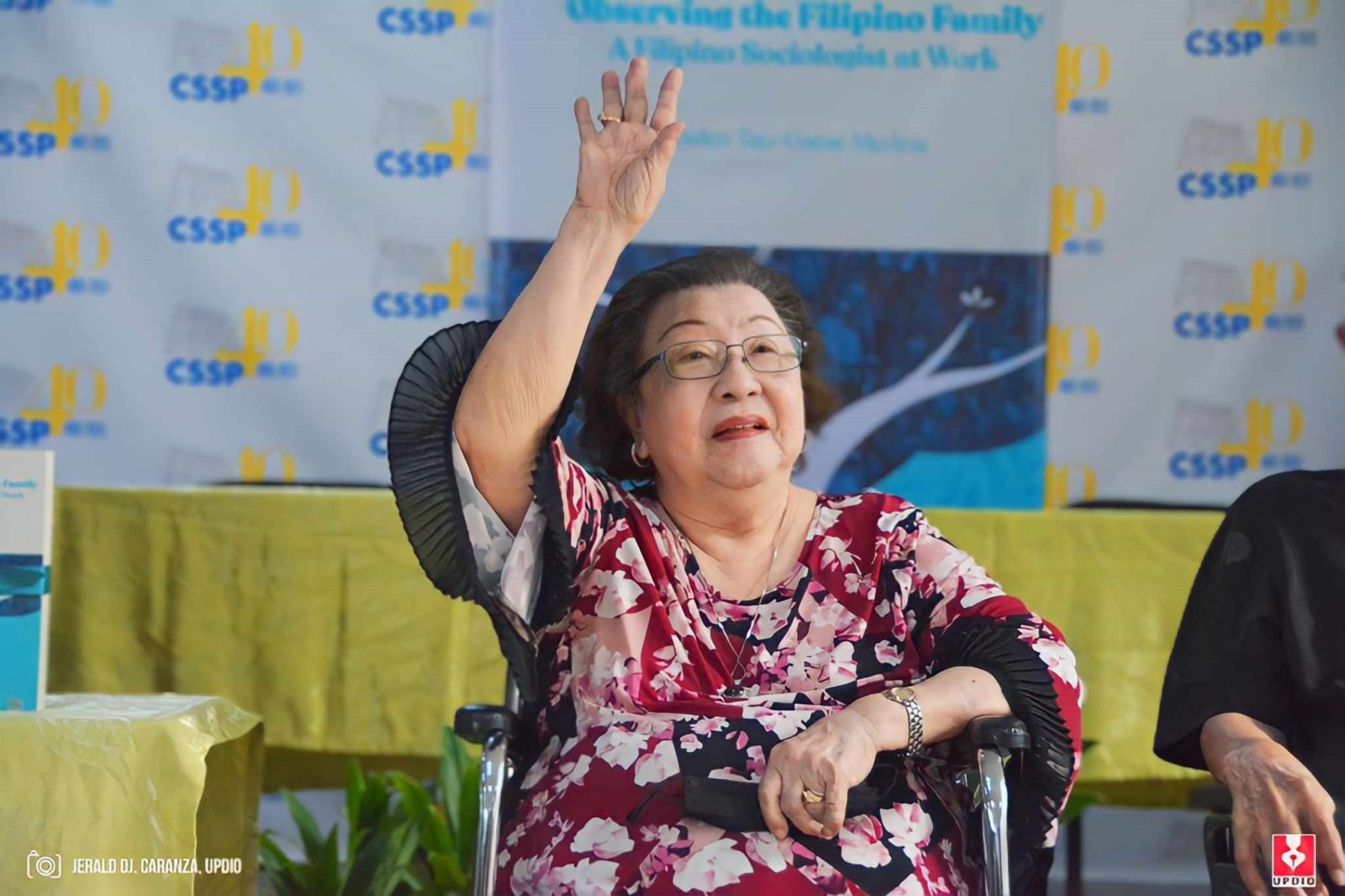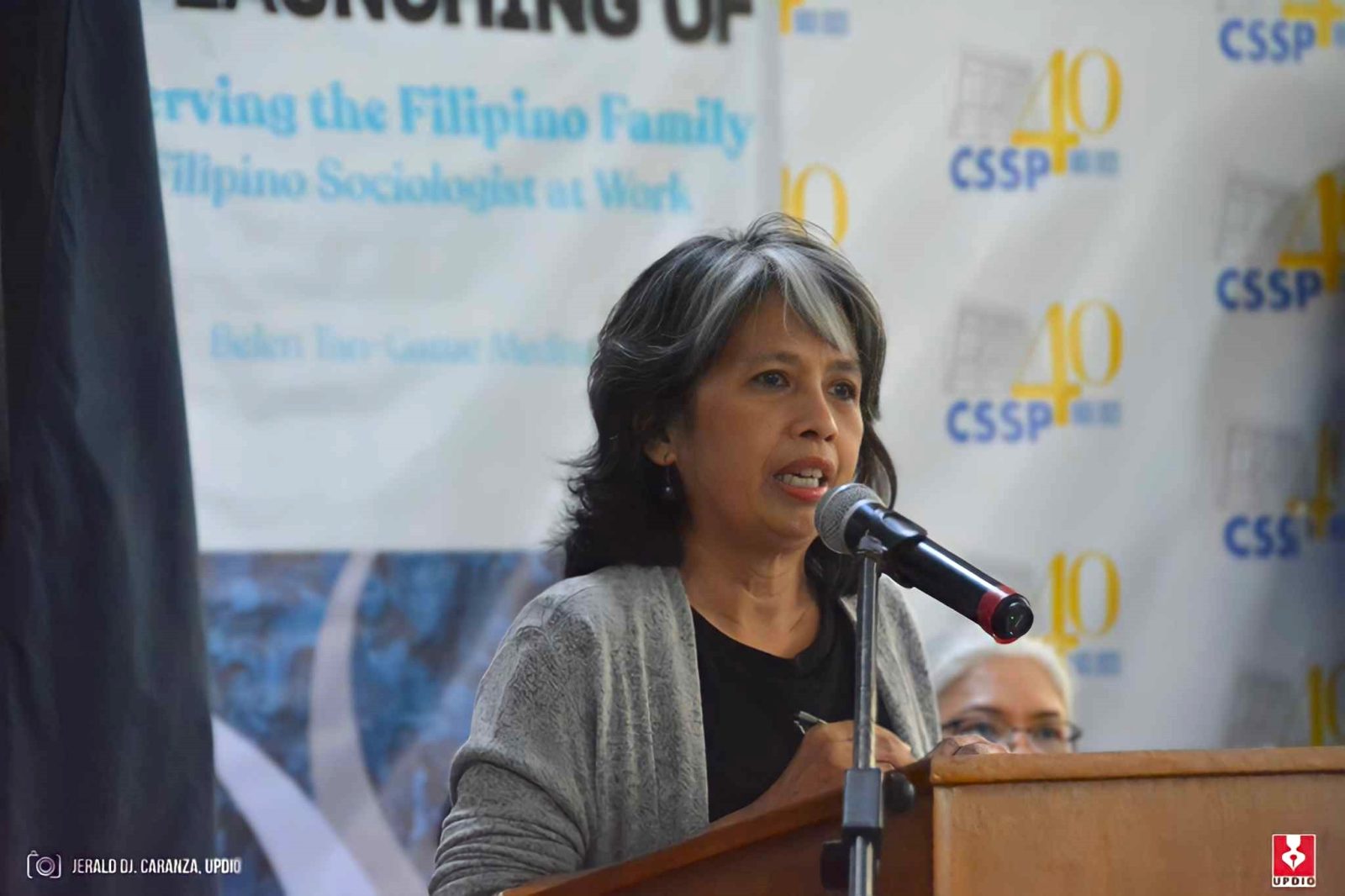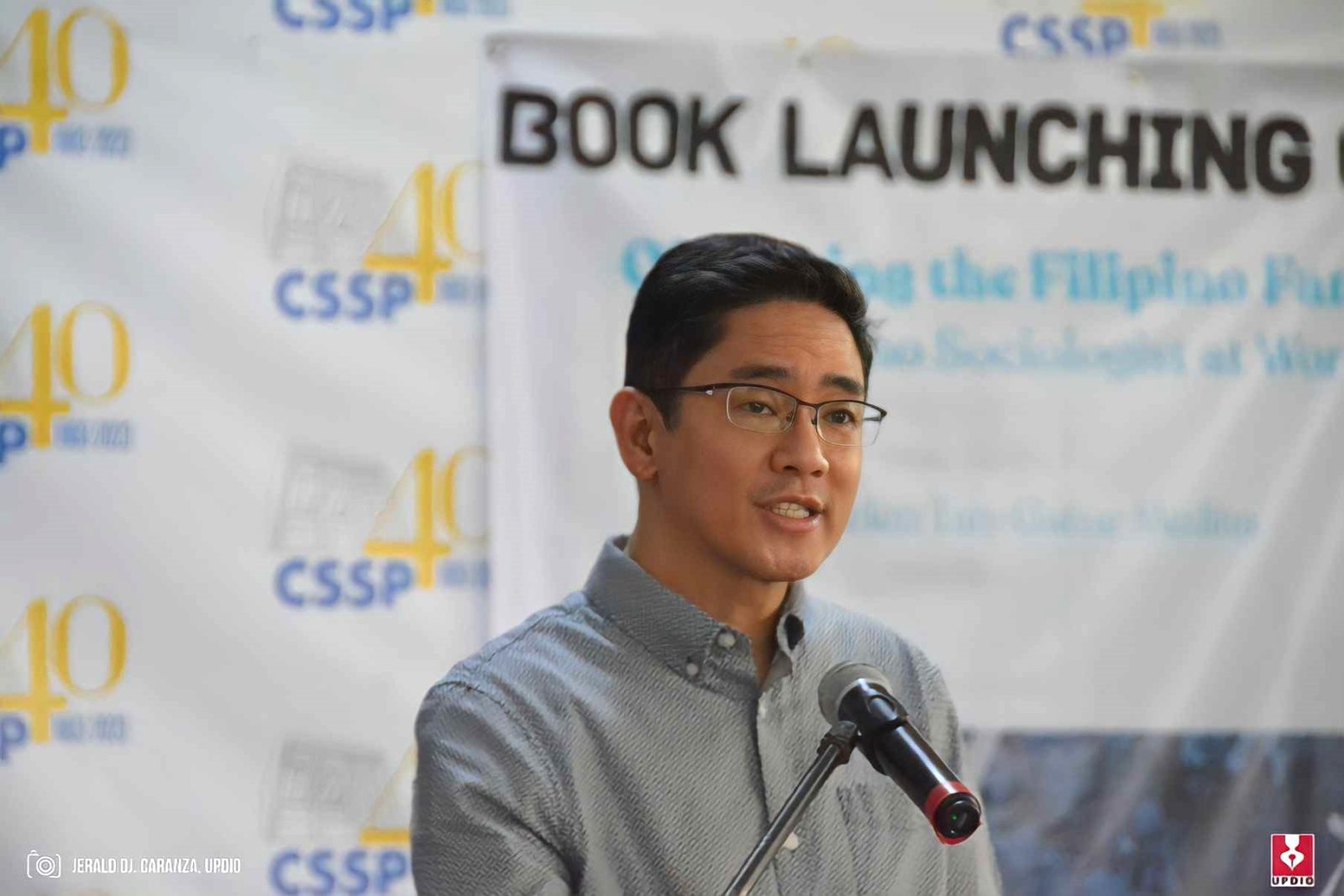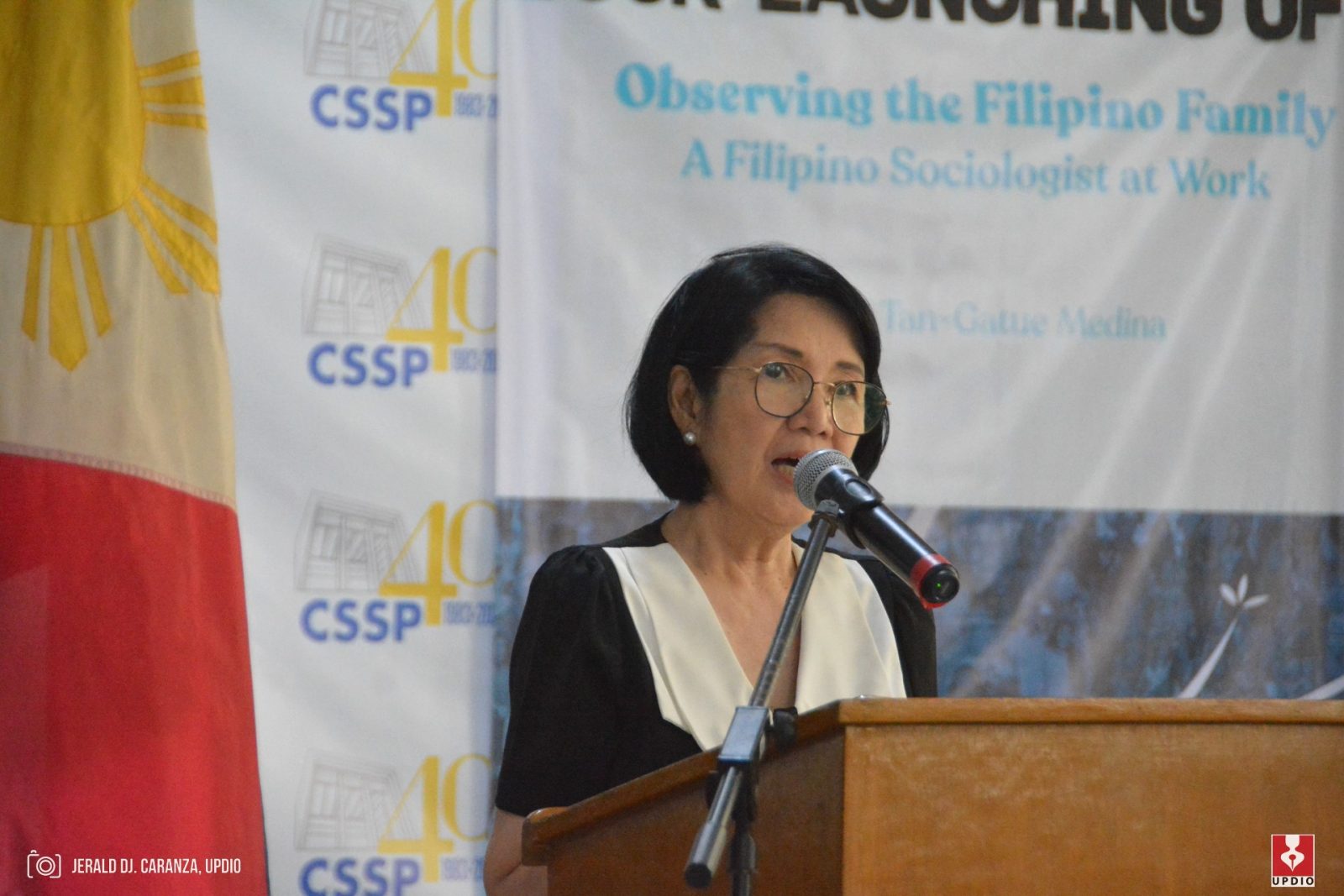It was a reunion of sorts as long-time friends and family gathered on Jan. 26 at the launch of Observing the Filipino Family: A Filipino Sociologist at Work [Observing the Filipino Family], the latest book of Belen Tan-Gatue Medina, PhD at the Palma Hall lobby.

The audience turnout was quite impressive as two UP presidents, some UP professors emeriti, and past and present University officials were in attendance, apart from the distinguished alumni spotted at the occasion. They were there to support and celebrate Medina and her latest achievement.
UP Diliman (UPD) Department of Sociology (DSocio) Chair Ma. Teresa R. Melgar said Medina is DSocio’s beloved retired professor who taught in DSocio for 53 years and was its chairperson twice.
“As we all know, this occasion also allows us the opportunity to celebrate Prof. Medina and her lifetime of scholarship, her rootedness to UP as well as her rootedness to this group of people. Family and friends have all come together to share this moment with her. We are here to celebrate Prof. Medina’s enduring contributions to scholarship,” Melgar said.
She said the event highlighted the family and Medina’s “insightful sociological studies on this important social institution in a time of rapid change.”


According to a post of the University of the Philippines Press (UP Press) on its Facebook page, accessed on Jan. 29, Observing the Filipino Family “contains a compilation of selected papers and lectures, published and unpublished, which the author accumulated during the 55 years of her career in the academe.” The post further stated that it is “a valuable book of reading on the sociology of the family and a useful reference for courses in home economics, social work, education, and other social sciences.”
UP Press Director Galileo S. Zafra said working with Medina was always UP Press’ pleasure and honor. The press worked with her in 1991 on her book, The Filipino Family, as well as its second and third editions published in 2001 and 2015, respectively.

“Hindi ito mga simpleng reprint lamang, kundi sadyang mga bagong edisyon. Nangangahulugang patuloy ang mataman at walang pagod na pagsubaybay ni Dr. Medina sa nagbabagong hugis at hulma ng pamilyang Filipino ayon sa nagbabago ring konteksto ng bansa at mundo,” Zafra said of Medina’s previous books.
Zafra said that Observing the Filipino Family proves that Medina is the leading authority in the field of sociology of the Filipino family in the country.
“Inipon dito ang mga papel at lekturang ibinahagi niya sa halos anim na dekadang karera niya sa akademya. Tumatalakay sa iba’t ibang aspekto ng pamilyang Filipino ang unang bahagi. Ang ikalawa naman ay salaysay ng mga personal na gunita at danas bilang estudyante, guro, mananaliksik, at bilang anak, asawa, ina. Mga karanasang kapuwa hinugis at humugis ng kanyang mga kabatiran at karunungan… Ang ’di natitinag na patotoo niya sa napili niyang larangan ng pananaliksik ay hindi lamang nagpapakilala ng kanyang akademikong interes kundi magpahiwatig din ng tunay na malasakit niya sa pamilyangFilipino,” Zafra said.
The book is currently available at the UP Press.
Meanwhile, Randolf S. David, PhD, university professor emeritus of sociology, underscored the importance of Medina’s work.

“Today, who can deny that the family is in the heart of everything significant that happens in the Philippine society? It is the family and no other institution that has sustained half a century of Filipino labor export,” David said. “It is also the Filipino family that underpins much of what we understand as a dynastic political system of our society. Business corporations are basically family enterprises. I dare say that our political culture has remained a puzzle within our social science mainly because we have not dared to see it through the lens of a family as a dominant social institution in our society,” he added.
David, who wrote the book’s foreword, expressed his hope that Medina’s latest book would inspire younger sociologists to start studying the average Filipino family “as a crucible in which the basic trajectory of our society is determined.”
He also revealed that it was through the course on the sociology of the family that Medina taught that he came across and read two classical works on the sociology of the family which subsequently, David said, “convinced me to shift from literature, because I was a literature major, to sociology.”

For her part, former UP vice president for academic affairs Cynthia Rose B. Bautista said Medina paved the way for a richer, more nuanced understanding of the Filipino family.
Medina presented copies of her book to her three special guests, namely, former UP president and professor emeritus Francisco Nemenzo, UP President Angelo A. Jimenez, and first UPD College of Social Sciences and Philosophy (CSSP) dean Leslie E. Bauzon.

Medina explained Nemenzo was the dean when she became chair of DSocio.
“I’m so grateful that the President, who was then dean of UP College of Arts and Science (CAS) chose me,” Medina said. She added that Nemenzo proved to be one of the best deans CAS has ever produced. The CAS has since become the CSSP, the College of Arts and Letters, and the College of Science.
Jimenez, on the other hand, was Medina’s student in sociology. “The DSocio is so honored and is very proud to have produced a UP president,” Medina said.
Finally, Medina said it was during Bauzon’s term as chair of the Social Science Division of the National Research Council of the Philippines (NRCP) that she became the head of the Sociology, Demography, and Social Work Section of the division.
“It was during his term that I received funding for my research, and in fact, this book has a few articles that were based on these research funded by the NRCP,” Medina said.
In closing the book launch, CSSP Dean Ruth R. Lusterio-Rico said, “This is not just meeting people who have contributed to the molding of great minds, not just a gathering of eminent personalities, but really, just like a homecoming.”

